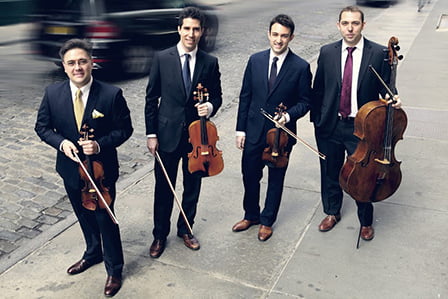Franz Schubert
Quartettsatz in C minor, D703
Arnold Schoenberg
Quartet No.1 in D minor, Opus 7
Felix Mendelssohn
Quartet No.3 in D major, Opus 44 No.1
We are pleased to welcome back the Escher Quartet for a second time. Our audience was overjoyed with their youthful, vibrant music-making in 2014, and they are back by popular request. The Escher is acclaimed for its profound musical insight and rare tonal beauty. In 2013, the Quartet became one of the very few chamber ensembles to be awarded the prestigious Avery Fischer Career Grant. The Escher Quartet has recorded the complete Zemlinsky quartets and the complete Mendelssohn Quartets, receiving critical acclaim for all of them.
The Escher Quartet takes its name from Dutch graphic artist M.C. Escher, inspired by Escher’s method of interplay between individual components working together to form a whole.
Ticket purchase powered by Artspoints.
If you’re at the concert, be sure to tweet us @FCMVancouver and use hashtag #FCMEscher!
Programme
Quartettsatz in C minor, Opus post, D 703 Franz Schubert (1797-1828)
Viennese proto-Romantic Franz Schubert composed the Quartettsatz (Movement for String Quartet) in December 1820, when he was 23, eight years before he died at 31. It represents the first movement of a Twelfth String Quartet which he never completed. A number of other compositions that Schubert began during 1820 were similarly abandoned, because he was experiencing a severe identity crisis at the time. This was at the time when Beethoven was the dominant musical voice in new music in Vienna, and Schubert was an admirer. Nevertheless, in its melodious style and structure the Quartettsatz was the forerunner of Schubert’s great late string quartets.
Here is a video of the Escher Quartet performing Schubert’s Quartettsatz:
String Quartet No 1 in D minor, Opus 7 Arnold Schoenberg (1874-1951)
Arnold Schoenberg is known most for his pioneering of the atonal 12-tone or serial means of composing music, a serious form – and dissonant sort of sound for many people. However, this tonal string quartet in four movements was young Schoenberg's first masterpiece. It was written at a time, in 1897, when he was under the influence of composer Gustav Mahler, and writing tonal Romantic music in his native Vienna, Austria. The quartet is remarkable for its density and intensity of orchestration with only four instruments.
The First Quartet is the work of an idealistic and optimistic young man at work and play in a field which included the music of Mozart, Beethoven, and Brahms as well as Reger, Wagner, Liszt, Schubert and others. In his fertile ear he absorbed as much from these masters as he added ideas of his own invention.
A different quartet playing Schoenberg’s Quartet, Opus 7:
Intermission
String Quartet No. 3 in D Major, Opus 44, No. 1 Felix Mendelssohn (1809-1847)
Mendelssohn, like Mozart a child prodigy as a composer, finished this quartet when he was 29 years old. In a letter to the violinist Ferdinand David, Mendelssohn wrote, “I have just finished my third quartet, in D Major, and like it very much. I hope it will please you as well since it is more spirited and seems to me likely to be more grateful to the players than the others.” This melodious, spirited and Romantic work rounds out the evening.
Another quartet who has played for FCM play the start of Mendelssohn’s Opus 44, No 1:
